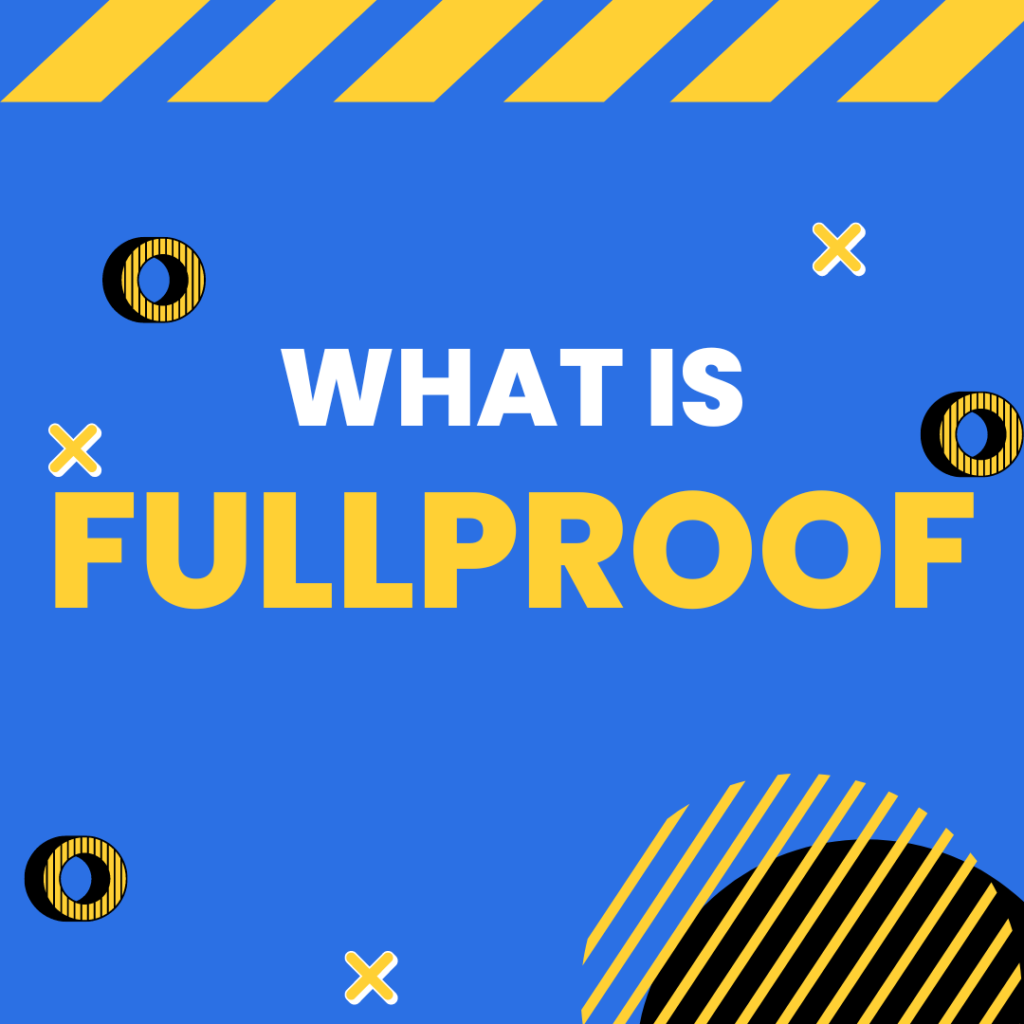
What Is Full Proof?
Foolproof has been an integral part of our vocabulary for years together. It is usually used to describe a plan or something structured as airtight. Often used synonymously with words like problem-free, reliable and perfect, foolproof invariably means no failure.
This word’s impact is so much that a 2003 movie is named it. Various dictionaries define the word ‘Foolproof’ in various ways. Let us look at some definitions.
The Merriam-Webster dictionary defines the word as:
“So simple, plain, or reliable as to leave no opportunity for error, misuse, or failure in a foolproof plan.”
The Cambridge Dictionary defines the word as:
“(of a plan or machine) so simple and easy to understand that it cannot go wrong or be used wrongly.”
Here are some uses of it as phrases in sentences:
- The system is pretty well foolproof.
- Cream blush is practically foolproof to apply.
- The directions are so simple that they are practically foolproof.
- The public knows that no security system can be foolproof, but some acknowledgement of accountability is warranted nonetheless. [Milwaukee Journal-Sentinel]
- This is not foolproof from a security standpoint since the malicious individual could simply configure their computer with an IP address on the network. [Digital Evidence and Computer Crime, Eoghan Casey]
- DNA testing was seen as so foolproof that alibis didn’t count. [Herald Sun]
- You can tweak it according to the talent, but nothing is foolproof, especially with young players. [Sports Illustrated]
- One foolproof method of contraception is sterilisation. [Life: The Science of Biology]
- Here, he shows a simple roasting technique that’s foolproof and infinitely adaptable. [Globe and Mail]
- This new recipe is supposed to be foolproof.
Now that we understand what ‘Foolproof’ is let us look at ‘Full Proof”. While most of us may know the individual meanings of the words ‘Full’ meaning not empty and bountiful or “containing or holding as much or as many as possible; having no space.” and ‘Proof”, meaning authentication or “evidence or argument establishing a fact or the truth of a statement.”, it is quite easy for one to think of these syllables put together as the word that reads ‘Full proof’.
While foolproof can mean airtight or perfect without flaws, even for fools not to make mistakes, full proof could mean proofed entirely or authentication of something in its full form. We can gather this from the literal meaning we can understand from the words singled out.
However, there is a larger responsibility of using words that make complete sense and provide a larger meaning that is conventional and understood by readers. The word ‘Fullproof’ is used in place of the actual word ‘Foolproof’ in multiple instances and many texts.
While contextually, the reader may understand the meaning of the word from the mentioned previous sentence or paragraph, as a writer, one of the most important responsibilities that are shouldered is to use the right words and the right grammar to put your ideas across. This is also rooted in the fact that using the right grammar and words will encourage others to use them. Thus you can avoid a thread of mistakes.
So what exactly is Full Proof?
Broadly we can call it a spelling mistake based on its origin word ‘Foolproof’ that retains the meaning but loses the authenticity. The concept of homophones and pronunciation of similar English words has led to confusion between the first syllables, ‘Full’ and ‘Fool’.
However, the existence of the word Fullproof in some texts legitimises its existence and has created a space or loophole for confusion regarding writers of the present and future. First, let us look at some of the places it has been used, though it seems to be an error.
- “Here are her three fullproof steps to achieving enviable hair, but be warned — it’s probably too late for you to take advantage of #3.” —Ericka Goodman, “The Secret to Anna Christina’s Schwartz’s Luxurious Locks.”
- “The extra safety measures are designed to make people feel safe, but Snyder acknowledges they are not fullproof.” —Derek Miller, Newsnet5.com.
- “English Bites! My Fullproof English Learning Formula’ – A Book By Manish Gupta.
This last example is probably the one that stands out the most. On the cover page of the book by Gupta, the design is so that the word ‘Fullproof’ has a red circle around it, pointing to the fact that choosing to spell it that way might be an intentional thing that he meant to do to pay dues to the fact that the word is to mean failure-free and perfect.
Often it can be so that using full proof instead of full proof takes away the meaning of the sentence itself or the phrase, completely changing the intended meaning of what you wish to say. In situations like this, you can get authentic or creative and use both foolproof and full proof in the same sentence retaining the meaning you wish to communicate to the reader.
An example sentence for this could be:
- Drinking a whole barrel of full-proof vodka is a foolproof way to wind up in the hospital.
The confusion between these two words is so apparent that some full-length videos and articles constantly talk about the difference between the two words. One can gather that the confusion is valid because of the legitimacy factor that many writers known for their work use the word in writing.
We must acknowledge that while full proof might not be the accepted conventional spelling, however, it is used widely in texts and by people. But the right way to use the word free of failure and mistakes is “Foolproof”, and that’s how we must use it conventionally.
Alternatively, to have a foolproof hand over grammar and to make sure that your writing is foolproof and fully proofed (that is, entirely proofread and authentic, not to be confused with the unconventional spelling of the original word), make sure that you use the right word.
Fools don’t use full proof and are foolproof with their grammar and writing!
Writecream provides 30+ tools for generating tons of content within seconds! Use Writecream to generate product descriptions, personalized emails, blog articles and much more and that too for free! Our free plan provides 20 credits every month which helps you generate 10,000 words per month!
Isn’t it amazing?
To get started, register here for our FOREVER FREE plan NOW!


